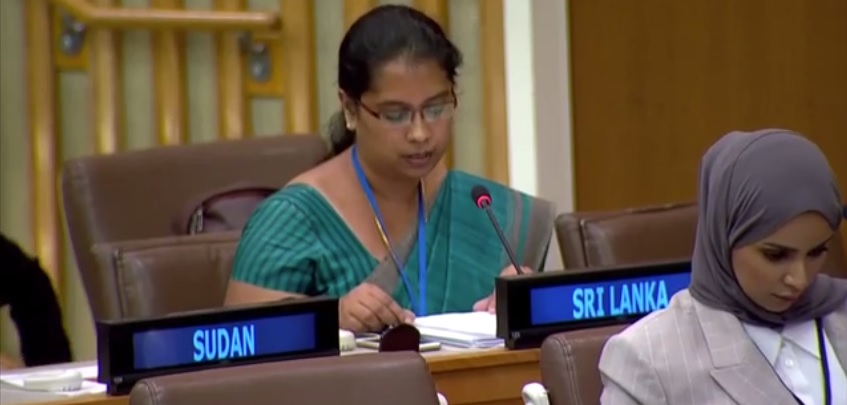
74th Session of the United Nations General Assembly (UNGA)
Third Committee
Agenda Item 66: Promotion and protection of the rights of children
Statement by the Sri Lanka Delegation
10th October 2019

Mr. Chairman,
Sri Lanka takes note of the reports presented by the Secretary-General on this important topic.
As one of the early signatories to the Convention on the Rights of the Child, we remain deeply concerned that the situation of children in many parts of the world remains critical. As underscored by the Secretary-General in his report A/74/240, despite ongoing improvements in many aspects of child well-being, there are in a number of areas where the scale of the challenges faced in realizing child rights remain daunting, with many children being left behind. The 2030 Agenda for Sustainable Development provides strategic opportunities for the global community to proactively invest in children and young people, there by protecting them from discrimination, inequalities and abuse.
It is widely recognized that education is a driver of poverty reduction, peaceful and inclusive societies and economic growth and that healthy children will one day contribute to the development of dynamic and productive societies. In this context, Sri Lanka continues to implement consistent and sustainable policies on education and health. This includes the provision of free and universal access to primary, secondary and tertiary education and raising the minimum age for compulsory education for all children from 14 to 16. As a result, the country has achieved close to universal participation in primary education and high school enrolment ratio is impressive. Among the dividends of the free and universal healthcare policy of the country is the progress made in advancing maternal health services in rural areas, which has been recognized in Secretary-Generals’ Report A/74/246. The neonatal and under-five mortality rate of children has also reduced in the country.
Mr. Chairman,
We are cognizant that that if no child is to be left behind in the context of the 2030 Agenda, the challenges facing millions of children need to be accurately assessed and addressed. Data and evidence are key prerequisites in this regard as they help to identify children with the greatest needs, the barriers that hold them back and their related solutions. The Ministry of Women and Child Affairs of Sri Lanka has prioritized case management and improving the collection of administrative data for children who have been victims of violence and abuse. We appreciate the Special Representative of the Secretary-General on Violence Against Children in her Thematic Report titled “Keeping the Promise: Ending the Violence Against Children by 2030”.
Sri Lanka maintains a zero-tolerance policy and strongly condemns all forms of violence against children. Priority has been given to the establishment of child and women bureaus in police stations and child protection officers are attached to all Divisional Secretariats across the country. Most recently, we joined the Global Partnership to End Violence against Children as a path finder country. The national implementation of strategies of the Global Partnership concept are being implemented in the country in collaboration with UNICEF, and leading INGOs and NGOs. We take this opportunity to appreciate the work carried out by UNICEF, in particular its office in Sri Lanka that has consistently worked with the national institutions towards the betterment of the lives of children in the country.
Mr. Chairman,
The positive shift in the approach towards child rights and recognition that violence and abuse of children should not be tolerated and that it can be prevented are encouraging. Sri Lanka calls for concerted global effort to address emerging challenges that threaten progress of children, including climate change, conflict, the spread of terrorism and violent extremism groups and cybercrime. Information and communications technologies are becoming an integral part of our everyday lives, including those of children, and while the benefits of these technologies need to be acknowledged, they also expose children to risks and harm. These issues transcend boundaries and close collaboration among all States is required to effectively counter and prevent them.
In demonstration of our commitment to eradicating challenges associated with the sale, prostitution and pornography of children, Sri Lanka signed the related Optional Protocol in 2002 and ratified it in 2006. The domestic legal frameworks that already contained a number of regulations aimed at preventing the sale of children, child prostitution and pornography, even prior to the country becoming a party to the Optional Protocol, have been further strengthened with the ratification of the Protocol.
As we celebrate, this year the 30thAnniversary of the Convention on the Rights of the Child, one of the most widely ratified human rights treaties, we must sincerely assess our accomplishments and failures in order to ensure that all children are provided with the opportunity to benefit from their civil, political, economic, social and cultural rights without discrimination of any kind.
Thank you.


